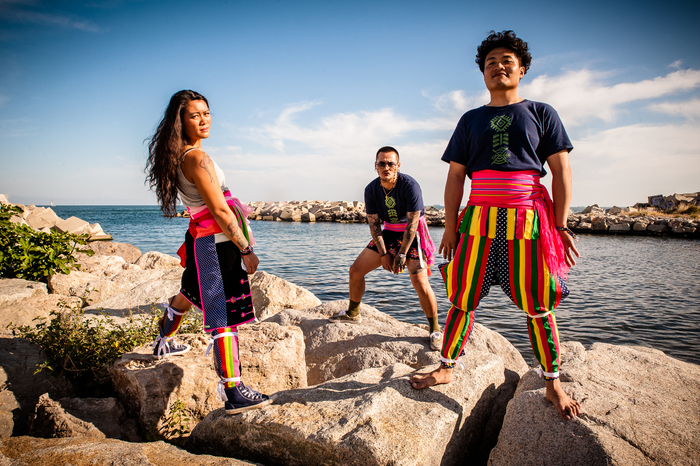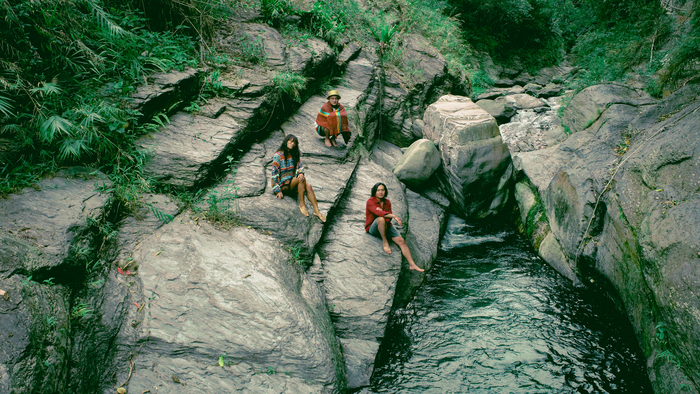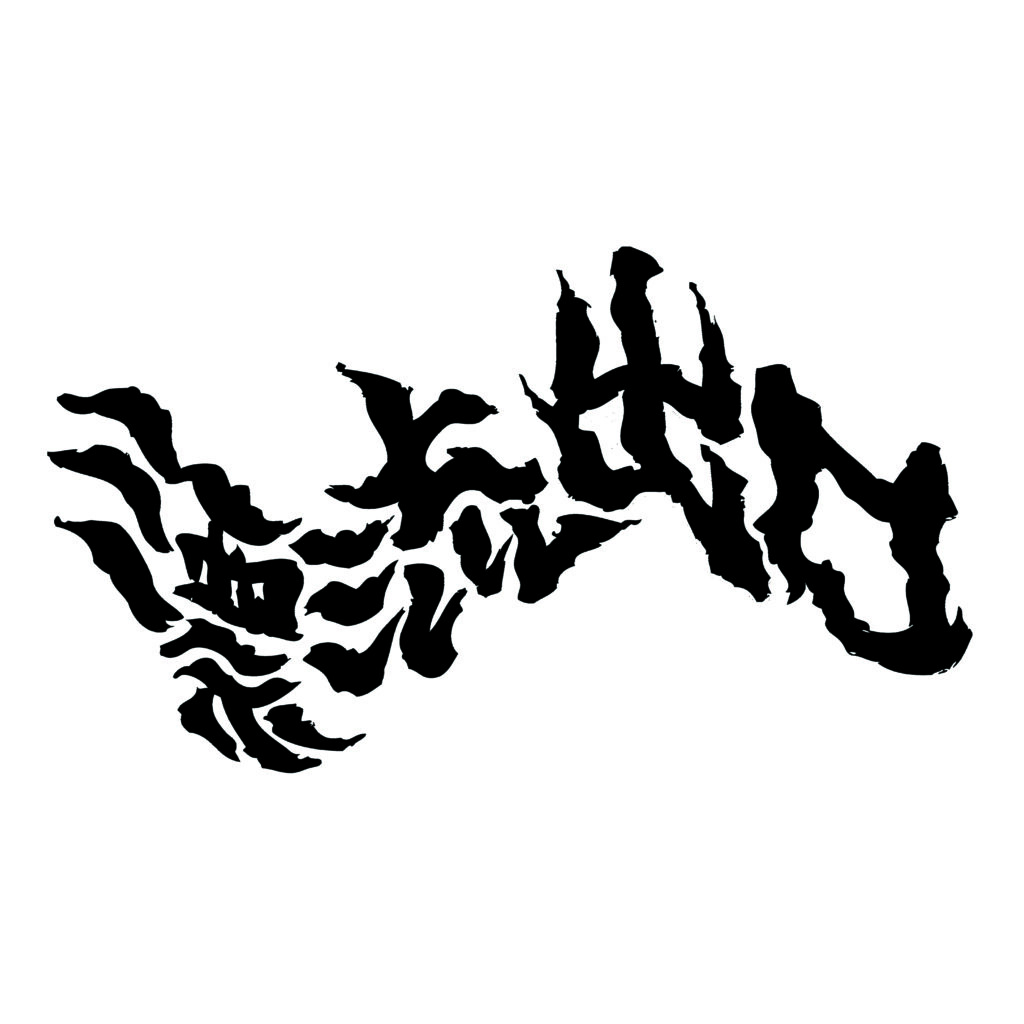
Outlet Drift is a trio from Taitung formed in the late 2000s, whose members are originally from the Amis aboriginal community: Putad Pihay on bass and vocals, Lin Ken on drums, and Wushang Pihay who, in addition to guitar and vocals, plays piano and traditional percussion. With their latest record, Lady of the Ocean (Wind Music, 2020), they won the 2021 Golden Melody Award for Best Indigenous Language Album.
Make no mistake, Outlet Drift's music is not just exciting for its Amis characteristics (although it is!) – their catchy, enchanting, and even poetic rock songs are universal music shaped by the beauty (and dangers!) of the sea.
From Amis’ traditions to rock music

— How did the band come together?
Lin Ken:
We are all relatives, we come from the same family, I’m their cousin.
Wushang:
I'm Putad's big brother! In the late 2000s, I tried to form a band but I couldn't find any members, so I turned to my family.
— Did you learn music on your own, or were you taught the Amis’ music in your childhood?
Wushang:
Music is deeply rooted in our ceremonies, in our culture. We have attended these ceremonies since childhood, so music is part of our daily lives. We learned to play our musical instruments years later, but we didn't feel it was so difficult because it was already in our blood.
Putad:
We have learned a lot of ancient melodies, and ballads from our parents, from our grandparents, but those are become rooted in us. So, when we were trying started to play instruments, it brought us back to the ancient ballads, the ancient melodies.
— On the internet, one of the adjectives you give to your music is “psychedelic rock”, which is a relatively young and renewed genre of music in Taiwan. But is it the indigenous elements that make Outlet Drift's music psychedelic or is it a way of understanding and playing rock that is not the same as in the Western countries?
Wushang:
In our musical traditions, the structure of a song is often circular. It is not like in Western songs, which have an intro, a middle, and an end. Amis' music works like a circle, which, for us, could be close to psychedelic music. But with each new repetition, you will be touched by a different emotion.
Putad:
For me, our music isn't just rock n’ roll. Above all, our instruments and our music reflect our own emotions. Depending on the music we like and the emotion we feel, we play music that isn't necessarily rock.
— In Outlet Drift, there are two singers, one male, and one female, and the melodic lines of the voices can have something similar to what you said earlier, ballads you heard as children, and sometimes a great stream of power in the way you sing. How do the two of you compose these beautiful vocal harmonies?
Putad:
The arrangements are also drawn from our traditional music. When I sing, I'm always reminded of the way our ancestors sang. They could sing very softly, like ocean waves, but also with great intensity, like a tsunami! I imitate the singing of our ancestors.
Wushang:
The process of creating music is all about compromise, really. We all have different thoughts and ideas. When we compose, we have to find a balance, even if there is a climax in the song, we have to find a way to balance everyone's voice. So, it isn’t about an unlimited explosion of sound. It doesn't matter whether the key is high or low, we always have to find the balance.
From drowning to emerging through the ocean

— Drowning (2015), the first album seems to be very dark, with heavy atmospheres, and crushing rhythms of the saturated guitar. Was there a form of pessimism in your music at the time?
Putad:
During the production of this first album, we tried to express the suffering of the second generation of Aborigines living in the city. A lot of anger and rage was building up in our hearts, and we wanted to express these dark feelings through the album.
Because of our indigenous identity, we felt the weight of loneliness in urban life. We wanted to express this loneliness and darkness through music. But I would also like to emphasize that it was back then. We always produce music that reflects our emotions in the present moment. It changes, it is different from time to time.
Wushang:
Back then, we suffered from a certain inner conflict, as our bodies were in the city, but our minds were still at home, in the tribe. Another experience the three of us had was that of near-drowning, an idea reflected in the album.
Putad:
It wasn’t precisely drowning, more like battling against the ocean for almost an hour, helpless. We know how to swim very well, but we have found ourselves too far from the shore because of the currents. It is a very dangerous experience.
Wushang:
The Mandarin name of this album, 逆游 ("nì yóu"), is more like swimming downstream. We wanted to fight against the current.
— The music video for "Tooth in Plastic Bag" which was released at the time was rather gloomy.
Wushang:
The track "Tooth in Plastic Bag" comes from a story our grandmother used to tell us. It is a story that is used to teach children a lesson, explaining that they shouldn't take things that don't belong to them. They are simply told that there are ghosts in the fields, to prevent them from wandering into the neighbors' fields at night. "Tooth in Plastic Bag" sums up the original idea of the album. These are legends, stories, and emotions that come to us from our indigenous community.
— After the drowning, comes resurrection in the water with Lady of the Ocean (2020)! The beautiful artwork immerses us in a more ethnic atmosphere, with this fish and this shape reminiscent of an Amis headdress. There are also some very pronounced ethnic music-inspired backing vocals.
Putad:
This album, Lady of the Ocean, marks a turning point. We have finally found the right way to use our mother tongue to compose. This is very important to us because it is only when we use our mother tongue that we feel in tune with ourselves. Another important thing is that we are modern people, so we have to find a balance with traditional elements.
— And the music video this time shows the sea in all its blue majesty. Can you tell us about this special atmosphere?
Putad:
Ocean is a part of us.
Wushang:
It is the first album we made after moving back to the seaside in Taitung, and that kind of atmosphere comes naturally to the music.
Lin Ken:
We are living by the sea, so when we compose, we always have these images in mind, these memories of people happily collecting shells or practicing other sea-related activities.
— Who is this lady of the ocean, anyway?
Wushang:
During the production of the album, we obviously thought that the lady of the ocean could be Putad and refer to her experiences, her personal stories, but there is more than that. The lady of the ocean also represents the whole generation of young Aborigines who have moved to the city and gradually lost their identity and their life skills under the impact of globalization. When they try to regain their original identity, they encounter many obstacles. This is what we wanted to express through the “lady of the ocean”. You could say that she represents all young Indigenous people.
Putad:
Women play a very important part in the Amis. Their work in their communities is often linked to the sea. Many of the resources they need to produce come from the sea. And they have gradually lost their connection with the sea. It is a situation that is common to all younger generations of Indigenous people in modern societies.

— Some of the songs are almost lyrical, like "Desert Planet". Which kind of world does it describe?
Lin Ken:
It is a reflection of the world we live in: like sea-level rise and the gradual disappearance of drinking water. If human beings can no longer live in their environment, then what's the point of doing all this! That is what we wanted to express with this song.
Wushang:
There is a line in this song: "if there's no water, how can we get fish out of it, how can we live in such circumstances?" It reflects our environmental problems. It is a situation that exists all over the world, that can be understood by a large number of people.
— You seem to be very busy lately, playing a lot of concerts. Does this mean you are working on something, like a new album?
Wushang:
Our main objective is to focus on the quality of our concerts. If we have time, we will write new songs. The new album won't be out until next spring, as Putad is about to embark on a tour of her own.
Lin Ken:
Expect a different album from the previous ones. Our music is constantly evolving.
Putad:
I never stop composing, but I don't put any pressure on myself. Once we have put our ideas in common, we will see how our music develops.


























